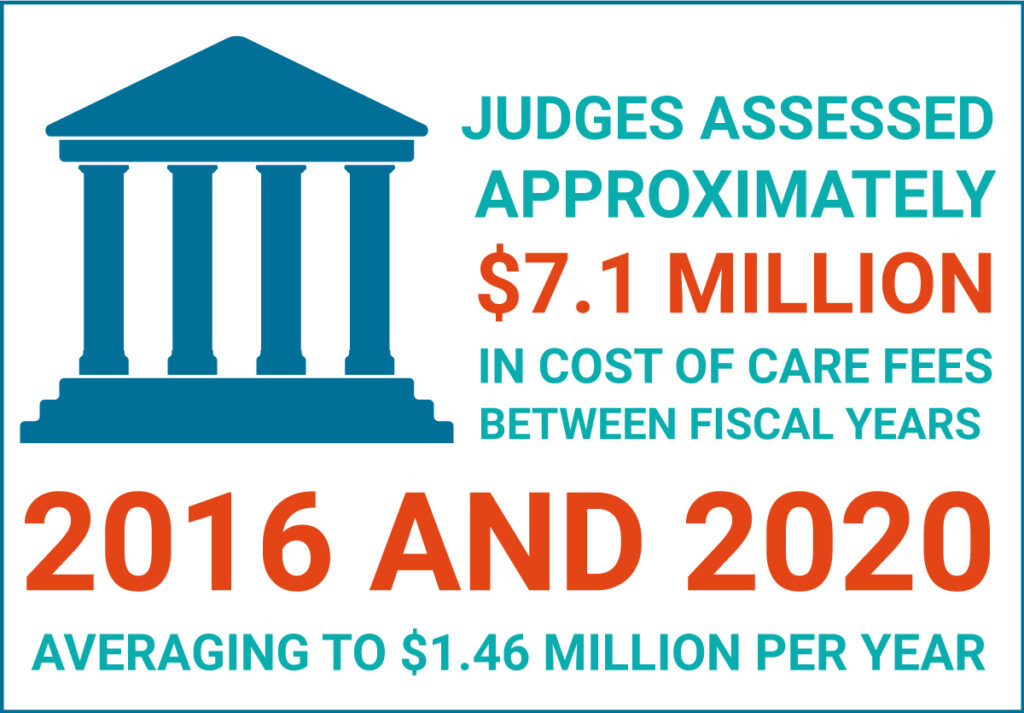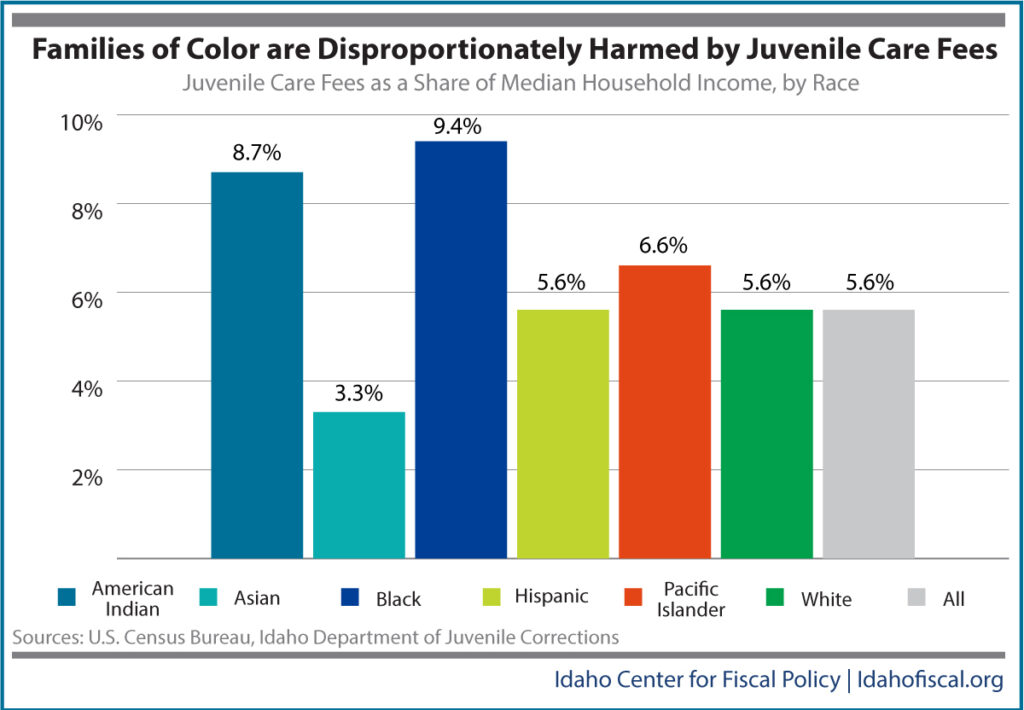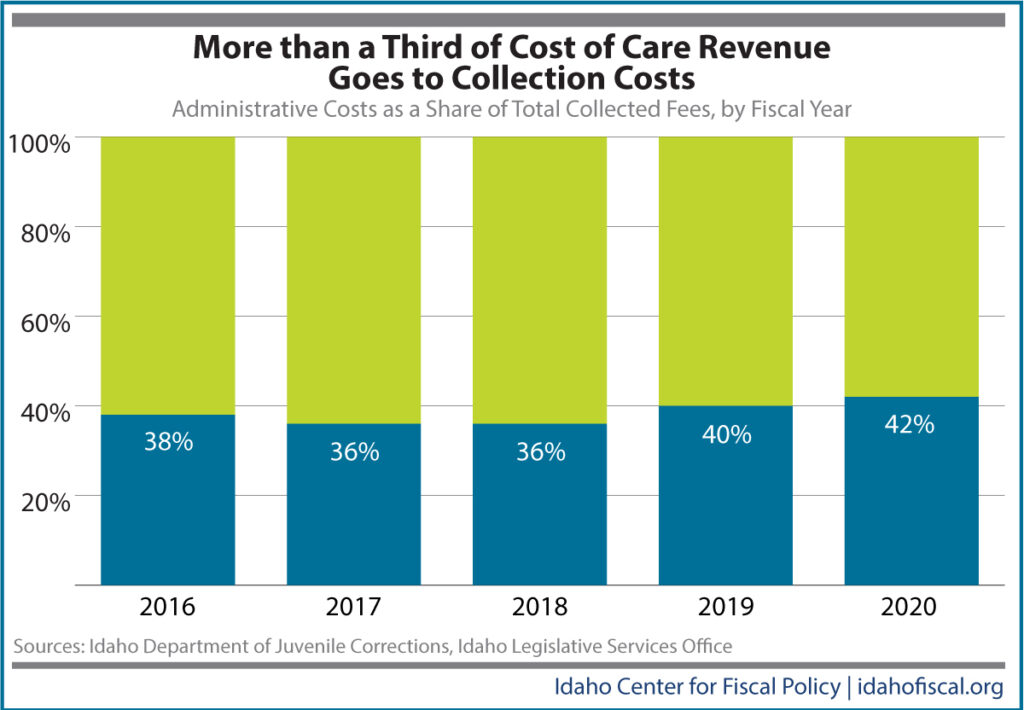Idahoans should insist that all public systems—and especially the juvenile justice system—operate with integrity and without a profit motive. However, juvenile courts in Idaho impose fines or fees with too little consideration of how these will affect a young person’s case or their life beyond their legal situation. These fees – known as parent reimbursement fees, or, cost of care fees – can result in heavy financial consequences for a youth and their family. Families with modest incomes and families of color feel this burden the most. To restore the integrity of the system, policymakers should take steps to ensure that equal justice is available to all – not only those who can pay their way out of problems – by eliminating fees, such as cost of care fees, in the juvenile system.
About the Cost of Care
This brief will focus on the impact of cost of care fees in the small share of Idaho juvenile cases – about five percent – in which youth are committed to the custody of the Idaho Department of Juvenile Corrections, or IDJC (the rest – about 95 percent – are handled at the county level through community supervision or county detention centers). IDJC works with youth identified as the most severe cases, and the department provides programming and treatment while the youth is in custody. On average, IDJC has approximately 260 youth in custody on any given day and their average length of stay is 18 months.1 Treatment plans for youths in IDJC custody are individualized and aimed at eventually reintegrating the child back into their community.
Juvenile cases are decided solely by judges, not juries. During the commitment process, the judge typically orders the youth’s parents to pay cost of care fees to reimburse the department’s costs of caring for the youth while in custody. While the fees are ultimately determined by a judge, it is IDJC’s standard practice to ask the court to order a fee of $150 per month per parent.2
An analysis of juvenile cost of care fee data obtained from IDJC over a 5-year period (Fiscal Years 2016-2020) reveals a system plagued by burdensome charges and wide disparities in charges, as well as racial inequity.
How Much Are Families Assessed?
Judges assessed approximately $7.1 million in cost of care fees between Fiscal Years (FY) 2016 and 2020, averaging to $1.46 million per year.3
How Much is Collected from Families?
Between FY 2016 and 2020, over $1.2 million total was collected in fees from 682 families with youth in juvenile custody, averaging to $246,849 per year and $1,807 collected per case per year.

• Black youth in Idaho made up 3.6 percent of collections, although they make up about 1 percent of Idaho’s youth population.
• The highest amount collected in fees from a family between FY16-FY20 was $13,425
How Much is Owed by Families?
IDJC currently has a total of $2.2 million outstanding balances across 907 cases, 60 delinquent accounts, and 492 accounts in collections (which comes with a 33 percent collection fee).
• The highest outstanding balance is a staggering $27,950 owed by the family of a Hispanic youth.
• Despite Black and American Indian families each accounting for about 1 percent of Idaho’s youth population, Black youth hold 4.8 percent of total debt and American Indian youth hold 3.3 percent of total debt.
• Pacific Islander youth have the highest average outstanding debt per case at $3,731.3
Cost of Care Fees Place Hardship on Idaho Families
Cost of care fees are overly burdensome on families and do little to promote the safe treatment and rehabilitation of the youth in IDJC’s custody. The Massachusetts Institute of Technology’s living wage calculator suggests that an Idaho family of four must earn between $5,425 and $6,680 per month to meet the minimum standards given the local cost of living.4 However, the average Idaho family earns $4,648 per month, and the impact of job and income discrimination means families of color bring home less. Judges have the discretion to assess – or not assess – fees to a juvenile when the youth enters the juvenile justice system. Families with low or limited incomes are more likely to struggle to afford basic necessities like paying for rent or nutritious food when they face unexpected expenses like these. Further, families unable to keep up with cost of care fees may have their accounts transferred to a collection agency, which comes with a 33 percent collection fee – pushing the family further into debt.4
Cost of Care Fees Fall Harder on Idaho Families of Color
An analysis of juvenile fee data obtained from IDJC indicates that cost of care fees inflict much greater financial burdens on families and youth of color. Due to job and income discrimination, households of color experience lower incomes compared with white households and, therefore, fees weigh more heavily on their budgets, as the chart below shows.

On average, Black and American Indian youth in IDJC custody are assessed higher fees by the courts, pay more in fees, and owe higher balances than white youth. Further, when accounting for average household incomes by race, cost of care fees cut further into an Idaho family of color’s household income than a white family’s income. These debts have the potential to follow families – and the youths in custody – for years.
Cost of Care Revenue is a Very Small Part of Overall Juvenile Justice Costs
The collection of juvenile cost of care fees is intended to offset the cost of a youth’s cost of care while in custody. But the simple collection of these fees costs IDJC an average of $94,239 per year in administrative expenses, eating up the already modest revenue stream the fees create.5 In 2020, 42 percent of cost of care fee revenue went to collection costs, a share that is just slightly elevated compared with previous years (see the chart to the below). When taking these collection costs into account, care fee collections only bolstered the IDJC annual budget by 0.3 percent. Eliminating the assessment and collection of these fees would have a negligible effect on the IDJC budget.

• Between 2016 and 2020, the average amount collected per year in cost of care fees was $246,849, compared with an average annual IDJC budget of about $48.4 million.6
• The annual cost to keep a youth in custody in Idaho is $138,868.7 A cost of care fee assessed at the suggested amount of $300 for a youth with two parents amounts to $3,600 per year – or only 2.5 percent of the total cost. Although $3,600 per year is inconsequential to IDJC’s overall budget, that amount places significant financial burden on an Idaho family.
Conclusion
Idaho lawmakers should remove cost of care fees from the juvenile court process. Doing so would not harm IDJC’s budget, but it would restore integrity to the juvenile justice system by removing barriers to success for Idaho youth.
- Idaho Center for Fiscal Policy analysis of data shared by Idaho Department of Juvenile Corrections on October 8, 2021. Daily count determined as an average of IDJC’s average daily counts for Fiscal Years 2016-2020
- Email correspondence with Idaho Department of Juvenile Corrections Director Monty Prow
- Idaho Center for Fiscal Policy analysis of data shared by the Idaho Department of Juvenile Corrections on October 8, 2021. Assessed fee values were calculated using guidance provided by IDJC. “Generally, reimbursement is ordered by the court in the amount of $150 per parent per month. Any court ordered amounts are equal to the average daily count within the IDJC with our average length of custody of approximately 18 months for each youth.”
- Massachusetts Institute of Technology. “Living Wage Calculator.” Accessed on November1, 2021 at https://livingwage.mit.edu/
- Email correspondence with Idaho Department of Juvenile Corrections Director Monty Prow
- Idaho Center for Fiscal Policy analysis of Idaho Department of Juvenile Corrections data. Idaho Legislative Services Office. “2020 Fiscal Source Book.” Accessed at: https://legislature.idaho.gov/lso/bpa/pubs/fsb/?y=2020
- Email correspondence with Idaho Department of Juvenile Corrections Director Monty Prow


